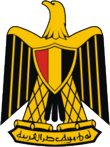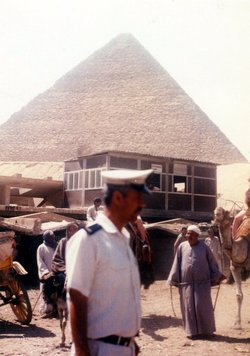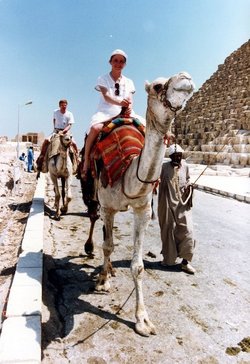Египет
Leo (обсуждение | вклад) (→Информация в интернете) |
Leo (обсуждение | вклад) (→Еда) |
||
| Строка 89: | Строка 89: | ||
==Еда== | ==Еда== | ||
| − | |||
| − | |||
| − | |||
| − | |||
| − | |||
| − | |||
==Покупки== | ==Покупки== | ||
Версия 18:50, 5 июня 2006
| |||||
| Девиз: нет | |||||

| |||||
| Столица | Каир | ||||
| Крупнейший город | Каир | ||||
| Официальный язык | арабский | ||||
| Государственный строй | республика | ||||
| Территория • Всего • Воды (%) |
1 001 450 км² 0,6 | ||||
| Население • Численность • Место в мире • Плотность |
77 505 800 15 77 чел./км² | ||||
| Валюта | египетский фунт LE (EGP) | ||||
| Часовой пояс • Летнее время |
+2 +3 | ||||
| Домен интернета | .eg | ||||
| Телефонный код | +20 | ||||
| Код автомобильного номера | ET | ||||
Египет - это государство в Африке и частично в Азии.
Содержание |
География
Города
История
Государственные и общественные праздники
- 1 января - Новый Год
- 25 апреля - День Освобождения
- 1 мая - День Труда
- 23 июля - День Революции
- 6 октября - День Армии
- 23 октября - День Суэца
- 23 декабря - День Победы
Памятка туриста
Телефоны оперативных служб
Санитарная обстановка
Разлитая в бутылки минеральная вода широко доступна, особенно Baraka ("Благословение"; компания принадлежит Nestl Г ©); марка Siwa (от оазиса того же самого названия) менее широко распределена. Прежний входит в 1.5 литра, один литр и бутылки полулитра. Если туристы просят воду, предполагается, что они подразумевают минеральную воду, если они определенно не спрашивают воду из-под крана (mayya baladi), который является безопасным выпить в главных городах и городах, но слишком хлорированный для неба среднего посетителя; люди с чувствительным stomachs должны определенно придерживаться воды в бутылках. Покупая минеральную воду, мудро проверить, что печать неповреждена; от не подозревающих туристов можно отделаться водой из-под крана - любимая уловка в курорте туристов Dahab.
Преступность
While relatively few in number, pickpockets are skilled and concentrate on tourists. Most operate in Cairo, notably in queues and on the crowded buses to the Pyramids. To play safe, keep your valuables in a money belt or a pouch under your shirt (leather or cotton materials are preferable to nylon, which can irritate in the heat). Overall, though, casual theft is more of a problem. Campsites, hostels and cheap hotels often have poor security, making it unwise to leave valuables there. At most places, you can deposit them at the reception (always get a receipt for cash).
If you are driving , it goes without saying you should not leave anything you cannot afford to lose visible or accessible in your car.
The level of terrorism in Egypt has been reduced, following a crackdown on Islamic extremists and a ceasefire signed in March 1999 by the terrorist group responsible for many of the attacks on tourists. Although security forces and government officials are the prime targets for terrorists, tourists have reason to feel threatened, as Islamic radicals have shot at trains and tour buses, and even detonated a bomb inside one of the Pyramids. The worst incidents have been the killing of 17 Greek tourists in Cairo in April 1996, and the Luxor massacre of 1997 in which more than sixty people died. The situation is far from bad enough to warrant staying away altogether, but it's still a good idea to follow the news (as tourist attacks are often in response to Israeli actions), and also heed any travel advisory bulletins issued by your own government.
Aside from the (small) risk of riding through Middle Egypt on the train, it is easy to avoid trouble spots : the latest rundown of areas considered unsafe can be obtained from government advice lines in Britain (tel 0374/500-926) and the US (tel 202/647-5225), or from consulates in Cairo.
With the object of safeguarding tourists, certain travel restrictions have been imposed on foreigners. In Cairo, Luxor and Aswan, railway clerks have been told not to sell tickets for any trains up or down the Nile Valley except on those services designated for tourists, which have plainclothes guards riding shotgun. Tourist buses between Cairo and Israel, and from Aswan to Luxor or Abu Simbel (if operating), must travel in a convoy ( kol) with a police escort. Perversely, there is no formal ban on visiting "risky" areas, but the local police will certainly keep a close eye on you, and may insist on accompanying you to sites like Abydos or Dendara.
Another wise move is to respect local customs (in public, anyway). The less you stand out and cause offence, the smaller the chance of attracting any hostility. By going with the swim of society, you'll gain a measure of protection. There are also armed police everywhere, whose mission includes keeping an eye on your safety, but as their usual response to trouble is to let rip with Kalashnikovs, this is a somewhat mixed blessing. In the event of real trouble , hit the deck or get off the streets immediately.
Местные обычаи и нравы
Таможенные правила и ограничения
Виза
Посольства
Транспорт
Как доехать
- На самолете:
- На автомобиле или автобусом:
- Поездом:
- По морю:



